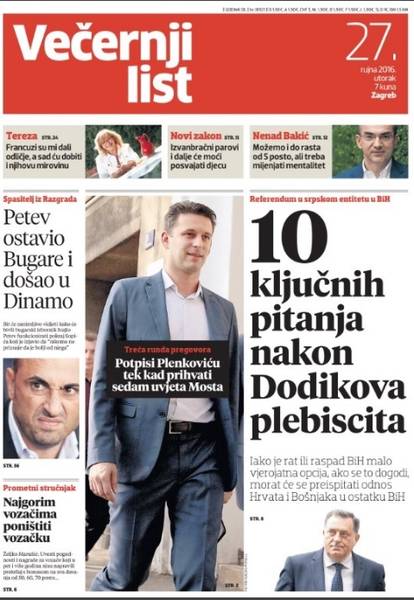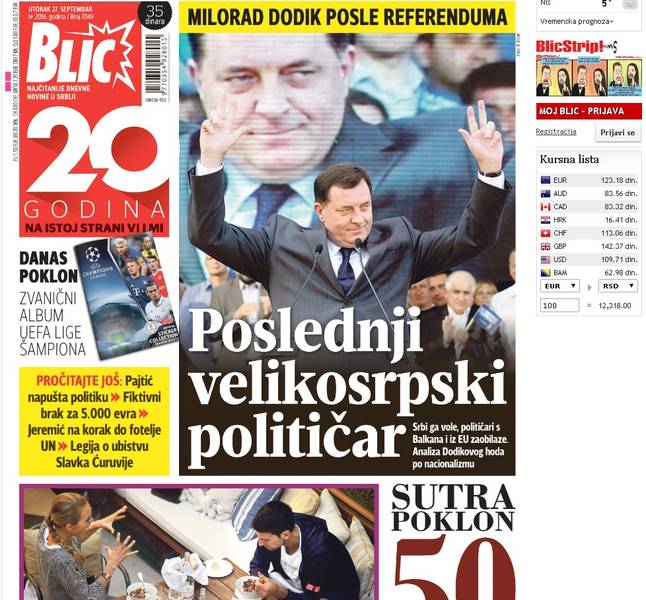Winners and Losers in the Bosnia Referendum
Adelina Marini, September 27, 2016

Day two after the referendum in the Serbian part of Bosnia and Herzegovina. There is already no trace of tension, sober analyses prevail throughout the region. Croatian Vecernji list published on its front page today 10 questions, following “Dodik’s plebiscite”. Does the successful referendum mean that Republika Srpska is now a state is the first question that the author Dejan Jazvić gives a negative answer to from Sarajevo. The holding of the referendum has no legal value, because even Dodik and his assistants say that they will follow the Constitutional Court’s ruling through a legal change. What could the outcome of the referendum mean for BiH as a state is the second question. The answer: “What the referendum did change is the political climate and relations between the different nationalities, which are thoroughly poisoned in BiH and will probably remain so for quite some time”.
What does the referendum mean for the Serbs, the Bosniaks, and the Croats? To Dodik, this is a demonstration of readiness to stand against the Dayton autonomy. Bosniak media do not attempt to hide their disgruntlement with the international community, and the Croats keep to the side, for they are against a complete disintegration of BiH, but also against unitarisation, which is the unaccomplished goal of Bosniak politics. The fourth question is what could the next referenda be, after Dodik already announced such a possibility. The goal of any referendum, in Dodik’s words, is halting any attempts at “humiliating” RS. So anything perceived as a humiliation attempt, as was the case of the removal of the coat of arms, the anthem, and the current experience with the abolition of the national holiday will be an excuse for a referendum.
How is the referendum viewed by the EU and the High Representative Valentin Inzko? There is talk in Sarajevo about a silent isolation of Dodik and RS, but sanctions or even apprehension of Dodik are highly unlikely. What is the talk on the referendum in the USA, which is the creator of modern day BiH in Dayton? American diplomats seem to be boycotting Dodik for quite some time now, but it looks like Washington is not ready to commit specifically to BiH, at least not until after the presidential elections in the US. What does the referendum mean for Russia, which wants to position itself back on the Balkans is Dejan Jazvić’s next question. According to some accounts, Putin’s influence in RS is larger than in Serbia and will probably continue to grow. This is the westernmost region of Russian influence in Europe.
Should RS truly become a separate state, could the Croats get their own entity? Although not too probable, a possible exit (Srexit?) of RS from BiH will open an opportunity for a reorganisation of the rest of the country, meaning a reconsideration of relations between Croats and Bosniaks in the federation, believes the journalist. Could the separation of RS lead to a new war? The disintegration of BiH and thus a new war are a very distant possibility. And the last question – will Dodik answer for Constitutional Court rulings violations? Not too likely. The decision to hold the referendum was made by the Parliament of RS, so it is difficult to draft an indictment against Dodik.
Slobodna Dalmacija also prints today a huge material devoted to the referendum under the headline “Dodik’s win. Where is Inzko?”. Who is the greatest winner from the referendum, asks author Zoran Šagolj. Without doubt it is Milorad Dodik, the RS president, he answers. “Quite a few analysts expected to the last minute that he will pull back. The cool support of Belgrade, and at the end of Moscow too, seem to have goaded him even further into remaining obstinate to Sarajevo and the rest of the world. Actually, he wanted and to a large degree succeeded in demonstrating that to a great degree he can fend for himself, without Vučić or Putin, because for 20 years he has been building and has built, most obviously, a state within the state”, continues the newspaper.
The list of losers is made up of two players, believes Zoran Šagolj. At the first place is Bakir Izetbegović. He expected that the international community will react after he managed to obtain a legal ruling naming the referendum anti-Constitutional and banning its holding. The other looser without doubt is the High Representative Valentin Inzko and the part of the international community he represents. “Since the Austrian came to Bosnia geopolitical circumstances have changed fundamentally. There is no more common international policy, but several different ones – American, European, Russian, Turkish, German”. His solace is the sizable compensation of close to 300 000 euro per year he receives, almost as much as Barack Obama.
In Bosnia and Herzegovina commentaries gave way to news and the upcoming local elections this Sunday, but there are several here and there. Klix publishes an interview by the Bosnian information agency FENA with the Swiss resident Dr Nenad Stojanović, according to whom the Sunday referendum was anything but an exercise in direct democracy. “When political leaders call a referendum with a question, the answer to which is well known, then this is no direct democracy, but a plebiscite, whose goal is to strengthen political positions. This comes in conflict with what direct democracy is”, believes the analyst. “The most important trait of direct democracy is that authorities are never certain whether they will win or lose, thus whether the majority of citizens will back the authorities’ position or not. This is the true direct democracy, for it forces politicians into paying attention to the citizens’ opinion”, says Dr Stojanović.
In a commentary for the Bosnian website 6yka Aleksandar Bećić analyses the referendum like this: "Dodik stated that a referendum is possible for the separation of RS; Vučić – that the most important thing is that everything went peacefully; the EU – that it does not recognise the referendum; Russia puts an end to this question; the Department of State is, of course, contra; Bosniak politicians in BiH call for sanctions against Dodik; the Sarajevo Prosecution announced a hearing of persons related to a violation of the BiH Constitutional Court rulings. And the people? How do they live?”, asks Aleksandar Bećić.
 The subject is once again on the front page of the Serbian Blic, which names Dodik “the last Greater-Serbia politician”. Vecernje novosti prints a commentary by Predrag Vasiljević, dramatically headlined “Freedom”. “The people of Republika Srpska had their say. By themselves, united, they decided which day to celebrate. By themselves they decided January 9th will be their holiday – the day of Saint Stephan. And this is not all. Serbs in Bosnia and Herzegovina did not vote for a separation from the state. They did not undermine the foundation of the Dayton fortress, which is of no great importance to them. They did not undermine peace or rattle any sabres. They did not put a finger in the eye of the West, or that of the Bosniaks, or the Croats. Nothing like that. With nothing more than a pen in hand 99.81% of the citizens, who went out to the referendum, voted for the protection of the line of common dignity. For upholding the right to have a day, when they can fly the flags high, loudly sing “Divine Righteousness”, and proudly mark their birthday. Just that, but fully sufficient for freedom. Well, it is just that fight for such a great value that has for the first time united all RS politicians and the people as well, which seems to stand the most in the way of Bosniak political chiefs in Sarajevo and the Euro-Atlantic forces”, says in the commentary.
The subject is once again on the front page of the Serbian Blic, which names Dodik “the last Greater-Serbia politician”. Vecernje novosti prints a commentary by Predrag Vasiljević, dramatically headlined “Freedom”. “The people of Republika Srpska had their say. By themselves, united, they decided which day to celebrate. By themselves they decided January 9th will be their holiday – the day of Saint Stephan. And this is not all. Serbs in Bosnia and Herzegovina did not vote for a separation from the state. They did not undermine the foundation of the Dayton fortress, which is of no great importance to them. They did not undermine peace or rattle any sabres. They did not put a finger in the eye of the West, or that of the Bosniaks, or the Croats. Nothing like that. With nothing more than a pen in hand 99.81% of the citizens, who went out to the referendum, voted for the protection of the line of common dignity. For upholding the right to have a day, when they can fly the flags high, loudly sing “Divine Righteousness”, and proudly mark their birthday. Just that, but fully sufficient for freedom. Well, it is just that fight for such a great value that has for the first time united all RS politicians and the people as well, which seems to stand the most in the way of Bosniak political chiefs in Sarajevo and the Euro-Atlantic forces”, says in the commentary.
Montenegrin Pobjeda also publishes a large material on centre spread. The results of the referendum do not mean that Milorad Dodik’s party will win the local elections on October 2nd, but all the nuisances and disagreements surrounding the referendum campaign have successfully throttled any discussion about the local elections. Apart from the victory in the referendum, Dodik managed to draw the opposition to his project as well and now the question is what will happen in the local elections next weekend, writes the Montenegrin daily newspaper. In an interview for the paper, Mladen Ivanić, the Serbian representative in the BiH presidency states that the opposition had no choice. “We had to accept the referendum, for otherwise we would have been named traitors.” He adds that the opposition insisted that the referendum is unnecessary.
Translated by Stanimir Stoev
 Bakir Izetbegovic, Andrej Plenkovic | © Council of the EU
Bakir Izetbegovic, Andrej Plenkovic | © Council of the EU Aleksandar Vucic, Recep Tayyip Erdogan | © Serbian Presidency
Aleksandar Vucic, Recep Tayyip Erdogan | © Serbian Presidency Jean-Claude Juncker, Zoran Zaev | © European Commission
Jean-Claude Juncker, Zoran Zaev | © European Commission